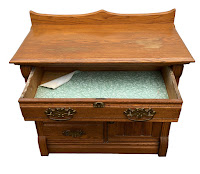 |
| New Silk Fabric Replaced Original Corduroy |
This is what is called a “cricket” rocker. The rocking mechanism is actually hidden underneath the seat and skirting of this cute little chair, allowing it to rock without moving the legs, as in a traditional rocking chair. I have done a chair similar to this one many years ago. It had the same rocking mechanism, but was a Windsor style chair with more exposed wood and no arm rest covers. You can see that chair here:
http://finalefurniture.blogspot.com/2012/09/the-ugly-rocking-chair.html
While similar to the other rocking chair, this one had many more components, thus required more work. But, since I had done a similar chair, I knew what to do on this one and in what order to work on each segment. As with the other checkered gingham chair, I began with the seat cushion. Like the gingham chair, it too had cording running along the top and bottom edges that curved around the shape of the foam. Luckily I was able to use the same foam for this chair. The fabric, a high-quality woven silk, required each raw edge to be serged so that they would not fray over time, causing the seams to split apart long before their time. This was an additional but necessary step.
fter I finished the seat cushion, I chose to work on the skirting and bottom part of the chair. I replaced the old, pushed in webbing with new upholstery webbing which is 3 inches wide and much stronger than the old rubbery plastic that was used. I attached the webbing with upholstery tacks (preferable to staples) and protected each raw edge with string tape. Once the webbing was done, I replaced the original webbing cover with another piece of the new fabric, with finished edges that were cut at angles in the corners to match the original.
I measured the two skirting sections, front and back, and cut two very long, continuous strips of fabric for each one. I measured each pleat to be 3 inches between pleats and it worked out to be the perfect amount to fit evenly from beginning to end for the front and again for the back. Remembering the difficulty I had attached the pleats in the other chair I had done, this time I stitched the pleats on the sewing machine, then carefully measured them against the chair before attaching them permanently.
After the skirting was complete, I made the arm rests, copying them from the original pattern as I did with the rest of the pieces and attaching them to the arms with two sets of Velcro straps so they don’t slide off. They were tricky because I cut the fabric to flow with the curve of each arm’s end. It looked much better having these arm covers fit the exact shape of the wood beneath.
The back cushion had its own challenges. The original cushion had four snaps that held it in place from the back of the chair. Anticipating the outcome, I made the new snap straps long enough to be adjusted when the time came to attach them. Prior to sewing the cushion front to back, I placed the straps where I thought they would go, pinned them in place, then sewed them to the back side of the cushion with long basting stitches. Once the cushion was done, I realized the straps didn’t quite reach the snaps, but no worries. I opened up the seams and pulled the straps further out to reach the snaps. Boy, was I glad I left additional fabric to reach the snaps once the cushion filled the fabric sides.
(Experience really is the best teacher). Because the other chair also had snaps, I knew longer fabric would be necessary to make the new straps reach. (The other chair had three snaps on the top edge only, while this chair had two snaps on the top and two on the bottom).
Each cushion received a zipper in the back and bottom for easy removal if they require washing or dry cleaning. Making these type of seat cushions isn’t my favorite thing to do, but it is a great feeling to know that it is a skill I have developed with experience and a LOT of patience.



























